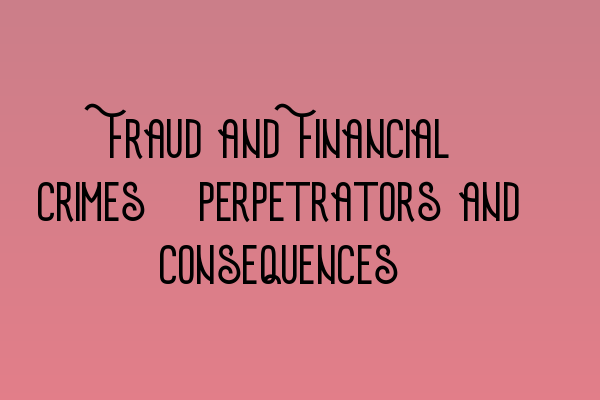Fraud and Financial Crimes: Perpetrators and Consequences
Financial crimes, such as fraud, have become increasingly prevalent in recent years. Perpetrators of these crimes employ various deceptive tactics to swindle individuals, businesses, and even governments out of their hard-earned money. In this article, we will explore the different types of financial crimes, identify common perpetrators, and discuss the severe consequences they face if caught and convicted.
Types of Financial Crimes
Financial crimes encompass a wide range of illegal activities committed for personal gain. Some of the most common types of financial crimes include:
- Fraud: Fraud involves intentional deception or misrepresentation for personal gain. This can take many forms, such as identity theft, credit card fraud, or insurance fraud.
- Money laundering: Money laundering is the process of making illegally obtained money appear legitimate by concealing its true origins.
- Insider trading: Insider trading involves trading stocks or securities based on non-public information, giving the trader an unfair advantage.
- Embezzlement: Embezzlement occurs when someone entrusted with managing finances misappropriates funds for personal use.
- Identity theft: Identity theft is the fraudulent acquisition and use of another person’s personal information, usually for financial gain.
Common Perpetrators
Financial crimes can be perpetrated by individuals, organized crime groups, or even employees within organizations. Here are some common perpetrators:
- Individual fraudsters: These are independent individuals who engage in fraudulent activities, often targeting vulnerable individuals or businesses.
- White-collar criminals: Typically found in corporations or financial institutions, white-collar criminals use their positions of trust to commit financial crimes, such as embezzlement or insider trading.
- Cybercriminals: With the rise of technology, cybercriminals exploit online platforms to commit various financial crimes, including credit card fraud and identity theft.
- Organized crime groups: Sophisticated criminal organizations engage in large-scale financial crimes, such as money laundering, drug trafficking, and smuggling.
Consequences for Perpetrators
If caught and convicted, perpetrators of financial crimes face severe consequences. These consequences can vary depending on the jurisdiction and the severity of the offense. Some possible consequences include:
- Fines: Perpetrators may be required to pay hefty fines, often based on the amount of money involved in the crime.
- Imprisonment: Financial crimes can lead to significant prison sentences, ranging from a few years to decades, depending on the offense.
- Restitution: Perpetrators may be ordered to repay the victims for the financial losses they incurred.
- Asset seizure: Authorities may confiscate the ill-gotten assets of the perpetrators, including properties, vehicles, and other valuables.
It is important to note that the consequences mentioned here are not exhaustive, and the actual penalties can differ based on the specific circumstances and the applicable laws. It is always recommended to consult with legal professionals, such as SQE Criminal Law & Practice solicitors, for accurate advice regarding individual cases.
Conclusion
Fraud and financial crimes present a significant challenge in today’s society. As individuals and businesses, it is crucial to be aware of the different types of financial crimes and the tactics employed by perpetrators. By staying informed and taking necessary precautions, we can minimize the risk of falling victim to these crimes. Additionally, as legal professionals, it is our responsibility to ensure that perpetrators face the appropriate consequences for their actions.
For more information on related topics, you may refer to the following resources:
